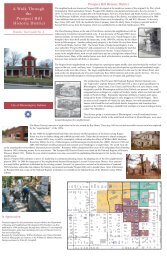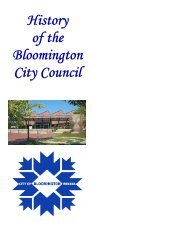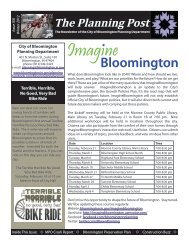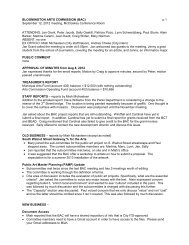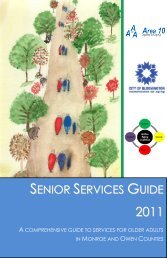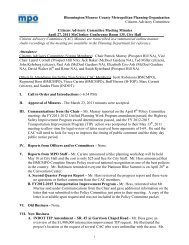Peak Oil Task Force Report - City of Bloomington - State of Indiana
Peak Oil Task Force Report - City of Bloomington - State of Indiana
Peak Oil Task Force Report - City of Bloomington - State of Indiana
Create successful ePaper yourself
Turn your PDF publications into a flip-book with our unique Google optimized e-Paper software.
MEDIUMTERM GOALS & STRATEGIES (515 years)<br />
1. Reduce the size <strong>of</strong> the <strong>City</strong> fleet by at least 25% though partnerships with carsharing<br />
groups.<br />
Many communities have successfully implemented such programs. For example, the <strong>City</strong> <strong>of</strong><br />
Philadelphia has a municipal fleet <strong>of</strong> approximately 6,000 vehicles and joined with the<br />
PhillyCarShare 116 , the community’s non‐pr<strong>of</strong>it car sharing service in 2004. 117 This was the<br />
first system worldwide in which government employees and local resident shared vehicles<br />
by the hour in a major effort to reduce the number <strong>of</strong> vehicles in the community. Within the<br />
space <strong>of</strong> four years, the project helped the <strong>City</strong> <strong>of</strong> Philadelphia eliminate 330 vehicles and<br />
save taxpayers almost $2 million annually. See the Transportation chapter for more details<br />
on car sharing.<br />
2. Implement a pilot GreasetoBi<strong>of</strong>uel Program whereby the <strong>City</strong> <strong>of</strong>fers local<br />
restaurants free vegetable oil collection for processing into biodiesel to fuel<br />
the <strong>City</strong> fleet.<br />
Communities such as San Francisco 118 and Seattle have started to leverage restaurant<br />
grease to fuel municipal vehicles as concern over the environmental harm <strong>of</strong> soy biodiesel<br />
mounts. 119 As discussed elsewhere, this would divert harmful fats, oil, and grease away<br />
from the <strong>City</strong>’s sewer system.<br />
LONGTERM GOAL (1530 years)<br />
1. Realize a Model <strong>City</strong> Fleet.<br />
All <strong>City</strong> vehicles, especially emergency vehicles, should be transitioned away from fossil‐<br />
fuel reliance.<br />
116 http://www.phillycarshare.org/.<br />
117 http://www.mayorsinnovation.org/pdf/PhiladelphiaFleetManagement.pdf; The <strong>City</strong>’s effort landed it as a 2006<br />
finalist for Harvard’s Innovations in Government Award<br />
http://www.innovations.harvard.edu/awards.html?id=15709<br />
118 San Francisco’s initiative can be found here: http://www.sfgreasecycle.org/thedish.shtml. Converting<br />
grease into bi<strong>of</strong>uel requires some processing including filtering, settling and decanting. If the <strong>City</strong> led the way<br />
in creating a demand for such product, it could help foster a whole new local green industry.<br />
119 In May 2009, Seattle mayor Greg Nickels directed the Seattle Fleet department to stop buying soy biodiesel<br />
after the EPA issued a report stating that ethanol production was potentially worse for the environment than<br />
gasoline. Chris Grygiel, “<strong>City</strong> <strong>of</strong> Seattle Halts Biodiesel Purchases, Looks for Greener Fuel,” Seattle Post<br />
Intelligencer, June 19, 2009.<br />
<strong>Report</strong> <strong>of</strong> the <strong>Bloomington</strong> <strong>Peak</strong> <strong>Oil</strong> <strong>Task</strong> <strong>Force</strong><br />
79



